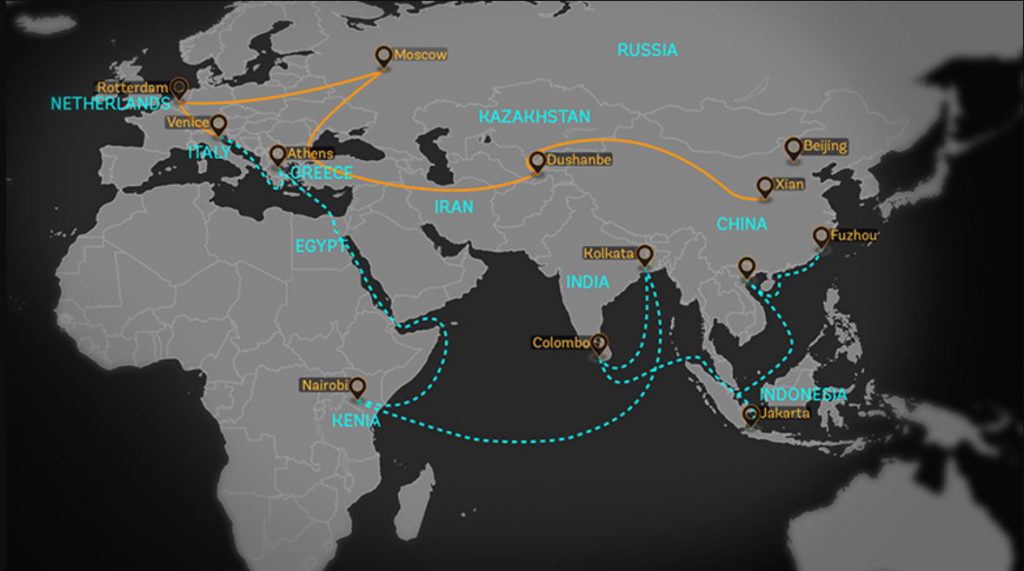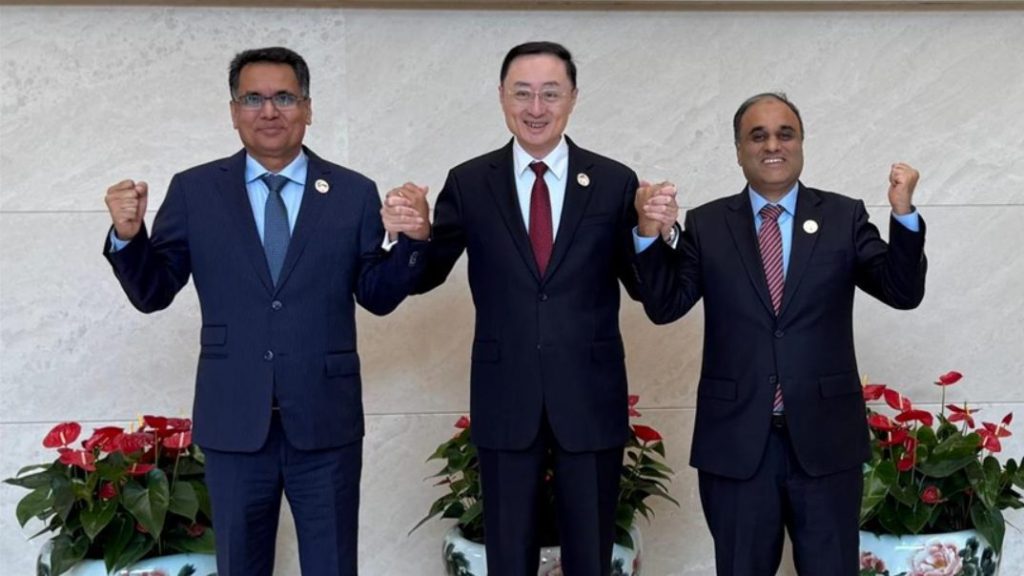CPEC’s De-Dollarization Strategy Powers Belt & Road Push in Asia

The CPEC de-dollarization strategy represents a fundamental shift in how China’s flagship Belt and Road Initiative operates across Asia, and also the China-Pakistan Economic Corridor is now expanding to include Bangladesh in a trilateral partnership. This CPEC de-dollarization strategy creates new financial mechanisms that reduce dollar dependency while also strengthening the Belt and Road Initiative’s reach across South Asia. The China-Pakistan-Bangladesh alliance marks a pivotal moment in Asia geopolitical strategy, as the CPEC economic corridor extends beyond its original scope right now.
#BREAKING: Bangladesh finally accepts a joint offer by China and Pakistan to link up with CPEC and Belt & Road Initiative. pic.twitter.com/kI6pgGCQqf
— Ironclad (@NavCom24) July 2, 2025
Also Read: China’s Addentax Textile Boosts Bitcoin Purchase to $1.3B for 12K BTC
Belt & Road Initiative Gains Momentum With CPEC De-Dollarization Shift

The CPEC de-dollarization strategy has gained significant momentum with Bangladesh’s acceptance of China and Pakistan’s joint offer to link up with the Belt and Road Initiative. This strategic move transforms the China Pakistan Bangladesh alliance into a powerful economic force that challenges traditional financial systems across the region, and also creates new opportunities for trade diversification.
Trilateral Summit Advances CPEC De-Dollarization Strategy

China, Pakistan and Bangladesh have agreed to advance trilateral cooperation across multiple sectors during their first trilateral meeting held in the Chinese city of Kunming. This partnership’s Asia geopolitical strategy demonstrates how the CPEC economic corridor can extend beyond its original boundaries, and also how regional cooperation can reshape financial systems.
Vice Foreign Minister Sun Weidong represented China at the summit, with Bangladesh represented by Acting Foreign Secretary Ruhul Alam Siddique and Pakistan’s Additional Secretary Imran Ahmed Siddiqui attending. The three sides committed to promoting cooperation based on principles of “good-neighborliness, equality and mutual trust, openness and inclusiveness, common development, and win-win cooperation.”
Prof. Cheng Xizhong, Senior Research Fellow at the Charhar Institute, stated:
“The strategic significance of the China-Pakistan-Bangladesh relationship is reflected in multiple dimensions such as geopolitics, economic cooperation, security and stability and global governance. Its core value lies in reshaping the development pattern of South Asia and even the global South through regional cooperation.”
Also Read: Pakistan UN Security Council President Backs BRICS Multipolar World Agenda
Multi-Sector Cooperation Strengthens Belt and Road Initiative
The trilateral structure has promised to find common courses on major issues such as trade, industry, maritime accord, water resources, agriculture, climate change, health, education, youth, culture, and think tanks. This also complements the policy of de-dollarization in CPEC, although it also provides new economic directions that do not follow previously existing financial structures, which are Western in origin, and it has established new trade systems.
At the time of writing, Prof. Cheng noted that the China-Pakistan Economic Corridor, as the flagship project of the Belt and Road Initiative, can be extended to Bangladesh and also other countries in the future, thus becoming a multi-national economic corridor. The construction of the China-Pakistan-Bangladesh-Myanmar Economic Corridor, along with industrial parks and logistics networks, promotes the closed-loop of resources-manufacturing-markets.
Read More

Chinese Tech Giants JD and Ant Group Push Central Bank to Launch Yuan Stablecoins Against Dollar Dominance
CPEC’s De-Dollarization Strategy Powers Belt & Road Push in Asia

The CPEC de-dollarization strategy represents a fundamental shift in how China’s flagship Belt and Road Initiative operates across Asia, and also the China-Pakistan Economic Corridor is now expanding to include Bangladesh in a trilateral partnership. This CPEC de-dollarization strategy creates new financial mechanisms that reduce dollar dependency while also strengthening the Belt and Road Initiative’s reach across South Asia. The China-Pakistan-Bangladesh alliance marks a pivotal moment in Asia geopolitical strategy, as the CPEC economic corridor extends beyond its original scope right now.
#BREAKING: Bangladesh finally accepts a joint offer by China and Pakistan to link up with CPEC and Belt & Road Initiative. pic.twitter.com/kI6pgGCQqf
— Ironclad (@NavCom24) July 2, 2025
Also Read: China’s Addentax Textile Boosts Bitcoin Purchase to $1.3B for 12K BTC
Belt & Road Initiative Gains Momentum With CPEC De-Dollarization Shift

The CPEC de-dollarization strategy has gained significant momentum with Bangladesh’s acceptance of China and Pakistan’s joint offer to link up with the Belt and Road Initiative. This strategic move transforms the China Pakistan Bangladesh alliance into a powerful economic force that challenges traditional financial systems across the region, and also creates new opportunities for trade diversification.
Trilateral Summit Advances CPEC De-Dollarization Strategy

China, Pakistan and Bangladesh have agreed to advance trilateral cooperation across multiple sectors during their first trilateral meeting held in the Chinese city of Kunming. This partnership’s Asia geopolitical strategy demonstrates how the CPEC economic corridor can extend beyond its original boundaries, and also how regional cooperation can reshape financial systems.
Vice Foreign Minister Sun Weidong represented China at the summit, with Bangladesh represented by Acting Foreign Secretary Ruhul Alam Siddique and Pakistan’s Additional Secretary Imran Ahmed Siddiqui attending. The three sides committed to promoting cooperation based on principles of “good-neighborliness, equality and mutual trust, openness and inclusiveness, common development, and win-win cooperation.”
Prof. Cheng Xizhong, Senior Research Fellow at the Charhar Institute, stated:
“The strategic significance of the China-Pakistan-Bangladesh relationship is reflected in multiple dimensions such as geopolitics, economic cooperation, security and stability and global governance. Its core value lies in reshaping the development pattern of South Asia and even the global South through regional cooperation.”
Also Read: Pakistan UN Security Council President Backs BRICS Multipolar World Agenda
Multi-Sector Cooperation Strengthens Belt and Road Initiative
The trilateral structure has promised to find common courses on major issues such as trade, industry, maritime accord, water resources, agriculture, climate change, health, education, youth, culture, and think tanks. This also complements the policy of de-dollarization in CPEC, although it also provides new economic directions that do not follow previously existing financial structures, which are Western in origin, and it has established new trade systems.
At the time of writing, Prof. Cheng noted that the China-Pakistan Economic Corridor, as the flagship project of the Belt and Road Initiative, can be extended to Bangladesh and also other countries in the future, thus becoming a multi-national economic corridor. The construction of the China-Pakistan-Bangladesh-Myanmar Economic Corridor, along with industrial parks and logistics networks, promotes the closed-loop of resources-manufacturing-markets.
Read More

